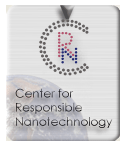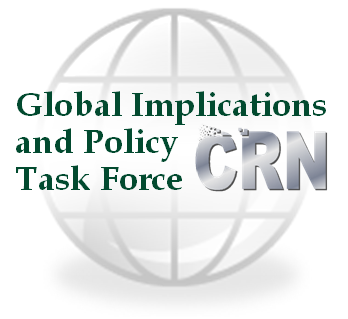















In August 2005, the Center for Responsible Nanotechnology announced the formation of a Task Force convened to study the societal implications of this rapidly emerging technology. Bringing together a diverse group of world-class experts from multiple disciplines, CRN is leading an historic, collaborative effort to develop comprehensive recommendations for the safe and responsible use of nanotechnology.
Progress toward developing the technical requirements for desktop molecular manufacturing is moving forward rapidly. The creation of a Technology Roadmap for Productive Nanosystems, undertaken by the Battelle research organization and the Foresight Nanotech Institute, highlights the urgent need for parallel policy discussions at the highest levels. CRN will not allow efforts to effectively prepare for the impacts of nanotechnology to lag behind advances on the technical side.
Without mutual understanding and cooperation on a global level, the hazardous potentials of advanced nanotechnology could spiral out of control and deny any hope of realizing the benefits to society. The CRN Task Force, led by a talented group of charter members, is undertaking this important work. Early efforts of the Task Force have underscored CRN's belief that there are no easy answers and no simple solutions.
From the beginning, the aim has been to concentrate first on fully defining the challenge:
|
|
What risks do we really face? |
|
|
How do they relate to each other? |
|
|
What is most important to know in order to design wise and effective policies for molecular manufacturing? |
For their first major project, the Task Force chose to generate a range of independent essays identifying and defining specific concerns. We encourage everyone to respond to this work and to future publications of the CRN Task Force with your questions, comments, and criticism.
The second major project of the CRN Global Task Force is the creation of a series of professional-quality scenarios of a near-future world in which exponential general-purpose molecular manufacturing becomes a reality. The purpose is to offer plausible, logical, understandable "stories" that illustrate the challenge of contending with the implications of advanced nanotechnology. What will that future look like? What can we learn from picturing it now that might help us to avoid the worst pitfalls and generate the greatest benefits?
Members of the CRN Task Force
CRN is proud to work with all these leaders in their respective fields to establish a factual foundation for advanced nanotechnology; identify potential problems arising from the technology and its administration; design recommendation for global solutions; plan and strategize the implementation of the solutions; and communicate Task Force findings to where they need to be heard.
Charter Members:
Nick Bostrom, Ph.D. — Director, Future of Humanity Institute, Oxford University
David Brin — Author, The Transparent Society
Robert A. Freitas Jr. — Author, Nanomedicine
Jerome C. Glenn — Millennium Project, American Council for the United Nations University
Ray Kurzweil — Founder and CEO, Kurzweil Technologies, Inc.
Chris Phoenix — Center for Responsible Nanotechnology
Mike Treder — Institute for Ethics and Emerging Technologies
Additional Members:
John Abbe — Co-Intelligence Institute
Mohamad Mova Al' Afghani — International Law, Indonesia
Fritz Allhoff — Western Michigan University
Amara Angelica — KurzweilAI.net
Michael Anissimov — Lifeboat Foundation
Russell Brand — Cataphora, Inc.
Damien Broderick — Author
Christopher Bunting — International Risk Governance Council
Michael Buerger — Bowling Green University
Steven Burgess — Burgess Consulting & Forensics
James Canton — Institute for Global Futures
Jamais Cascio — Open the Future.com
Steffen Christensen — Office of the National Science Advisor, Canada
Tom Cowper — Society of Police Futurists International
Tom Craver — Intel Corporation
Sonia Dalcomuni — Center of Law and Economics, Brazil
Jennifer DeLurio — Environment Agency of England and Wales
Sujoy Dutta — Senior Business Analyst, Delhi, India
Tyler Emerson — Singularity Institute for Artificial Intelligence
Fern Evitt — New Zealand Institute of Directors
Janet Fogarty, Esq. — Janet Fogarty & Associates
J. Storrs Hall — Nanorex
Robin Hanson — George Mason University
Graham Holt — Collegium Basilea
Lisa Hopper — World Care
James Hughes — Trinity College
Leslie H. Jarmon — The University of Texas at Austin
Carl Jensen — FBI Academy
Barbara Lamar — Attorney, CPA
Jaron Lanier — Silicon Graphics
Patrick Lin — The Nanoethics Group
Brian Lundquist — Publisher, Nanotechnology Now
Gary Marchant — Arizona State University
Jessica Margolin — Institute for the Future
Ralph C. Merkle — Institute for Molecular Manufacturing
Max More — Manyworlds, Inc.
Douglas Mulhall — Author
Ramez Naam — Author
Noel Nevshehir — Society of Manufacturing Engineers
Harvey Newstrom — IT Security Architect
Lauren O'Neill — Institute for Defense Analyses
Deborah Osborne — Buffalo (NY) Police Department
Giulio Prisco — Future Technologies Advisory Group
Jeremy Ramsden — Cranfield University
Rocky Rawstern — "Nanoscale Materials and Nanotechnology" (blog)
Glenn Reynolds — University of Tennessee
Rebecca Rippin — Euroresidentes.com
Wrye Sententia — Center for Cognitive Liberty & Ethics
Kenneth Sills — Immortality Institute
Marcene Sonneborn — Central NY Technology Development Organization
Alex Spencer — Student
Tihamer T. Toth-Fejel — General Dynamics
Gregory Trocchia — Independent Software Consultant
Thomas D. Vandermolen — Lieutenant Commander, U.S. Navy
Philippe Van Nedervelde — e-spaces
Michael Vassar — Futurist.com Consultant
Natasha Vita-More — Extropy Institute
David Voyle — Nano Tsunami
Brian L. Wang — Visa Corporation
Rosa Wang — Geographic Engine
Nathaniel Welch — Free and open source software developer/advocate
Society of Police Futurists International
The Nanoethics Group
Institute for Ethics and Emerging Technologies
Society of Manufacturing Engineers
Nanotechnology Now
World Care
Inform your communities


Home | About Us | Donate | FAQ | Nano Tomorrows | CRN Blog | Site Map | Contact CRN
Last updated on